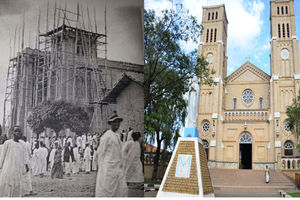
Author: Musaazi Namiti. PHOTO/COURTESY
Sometime last year, I watched a video in which Kenya’s president, William Ruto, was saying that seven shillings of every 10 he collects in taxes goes to servicing his country’s debt. The remaining three shillings, he added, are spent on salaries of civil servants, national security, building and maintaining infrastructure, etc.
It is all too easy to see that Mr Ruto is leading a country that is flat broke, especially when you consider the proportion he spends on debt servicing.
The finance Bill that triggered protests, in which 39 Kenyans have died, was meant to help Mr Ruto increase tax revenue. He needs money, not God, to run and manage Kenya well.
In my humble opinion, money is the only god that makes sense and works. I am not saying people who believe in God and take Him seriously should not. They have the right to worship their God. But I do know perfectly well that if a country does not have money, if people do not have money, they probably have nothing to fix their problems even if they have plenty of God all around them.
As I have previously written in this column, Ecclesiastes 10: 19 makes a compelling case why we should always have money. This Bible verse does not tell us God is everything; it tells us money is. And I want young people to grow up knowing this fact.
Kenyans took to the streets in anger and burnt parts of their Parliament because the government, which is desperately looking for money, wants to tax them heavily and take the little money they have. Without money, Kenyans know the God that holy books say lives in the sky will not and cannot fix their problems.
It is money that has forced Mr Ruto to make trips overseas to find jobs for unemployed Kenyans. Last October, he announced he had secured up to 350,000 jobs in Saudi Arabia, but this is a mere drop in the ocean, considering that Kenya’s official unemployment rate for 18 to 34-year-olds is nearly 40 percent, according to the BBC.
In real life, the god that feeds you, the god that clothes you, the god that sends your children to school, the god that buys or builds you a home, the god that will look after you in retirement and foot your medical bills is money, of course.
In Kampala, we have private, faith-based hospitals such as Kibuli, Namirembe and Nsambya that should provide free healthcare for poor patients, but they do not.
The hospitals are into money, and the first thing their doctors will look at before listening to your health problems is proof of payment.
People say money does not buy happiness and that rich people are not necessarily happy. But a 2021 paper published by the Proceedings of the National Academy of Sciences, a US peer-reviewed journal, confirms that money does influence happiness.
Even if the paper is not conclusive, we do know that when people live in decent homes, eat what they want and travel the world with their families, all of which require money, they feel generally happy. And higher earners feel an increased sense of control over life.
God does not provide that kind of control. African countries are very religious and know a lot about God. They talk to Him by way of prayer. There are more prayers than doctors in Africa, more churches than factories. But God has done almost nothing for African countries. If these countries had money, they would be more developed and prosperous.
Mr Musaazi Namiti is a journalist and former
Al Jazeera digital editor in charge of the Africa desk
[email protected] @kazbuk


